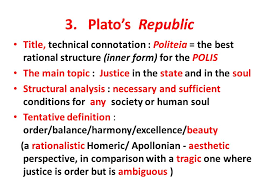

Parmenides combined these two views in his Eleatic School of thought which taught Monism, the belief that all of observable reality is of one single substance, uncreated, and indestructible. To Heraclitus, life was flux – change was the very definition of “life” – and all things came into being and passed on owing simply to the nature of existence. His younger contemporary, Heraclitus, rejected this view and replaced “God” with “Change”. He rejected the anthropomorphic vision of the Olympian Gods for a monotheistic vision of God as Pure Spirit. Xenophanes answers this with his claim that there is only one God who is the First Cause and also governor of the world. One's immortal soul goes through many incarnations, acquiring wisdom, and although Pythagoras suggests it finally joins with a higher soul (God), how he defined that oversoul is unclear. Numbers have no beginning or end and neither does the world or a person's soul. The definition of a First Cause was rejected by Pythagoras who claimed number as Truth. Anaximenes claimed air as the First Cause for the same reason Thales chose water: he felt it was the element which was the most basic component of all others in varied forms. Thales claimed it was water, but Anaximander rejected this in favor of the higher concept of the apeiron – “the unlimited, boundless, infinite, or indefinite” (Baird, 10) – which was an eternal creative force. The first three were focused on the First Cause for existence. Baird, the major Pre-Socratic philosophers were: These philosophers are known as Pre-Socratic because they pre-date Socrates, and following the formulation of scholar Forrest E. However he may have first developed his vision of a reasoned, empirical inquiry into the nature of reality, Thales began an intellectual movement which inspired others to do the same.

He would have certainly been exposed to Mesopotamian, as well as Egyptian, philosophy in his studies there, and this was most likely the source of his inspiration. While this certainly may be the case, there is no documentation to definitively support it while it is known that Thales did study in Babylon. He suggests that Thales might also have studied in Egypt and established this practice as a tradition others would follow. James notes that many later philosophers, from Pythagoras to Plato, are said to have studied in Egypt and, in part, to have developed their philosophies there. The second theory, however, actually makes more sense in that no school of thought develops in a vacuum and there is nothing in the Greek culture of the 6th century BCE to suggest that intellectual inquiry into the cause of observable phenomena was valued or encouraged. The standard explanation as to how Thales first conceived of his philosophy has been the first one cited above. It has long been established that ancient Greek philosophy begins in the Greek colonies of Ionia along the coast of Asia Minor as the first three Pre-Socratic philosophers all came from Ionian Miletus and the Milesian School is the first Greek philosophical school of thought. 8th century BCE) would illustrate it fully in his Iliad and Odyssey.

8th century BCE) codified this belief system in his work Theogony and the Greek poet Homer (l. Ancient Greek ReligionĪncient Greek religion maintained that the observable world and everything in it was created by the immortal gods who took a personal interest in the lives of human beings to guide and protect them in return, humanity thanked their benefactors through praise and worship, which eventually became institutionalized through temples, clergy, and ritual. In the present day, Greek philosophy is the underlying form of belief systems, cultural values, and legal codes all around the world as it has largely contributed to their development. The works of Aristotle, which would come to inform Christianity as much as Plato's, would also be instrumental in the formulation of Islamic thought after Islam was established in the 7th century CE as well as the theological concepts of Judaism.


 0 kommentar(er)
0 kommentar(er)
